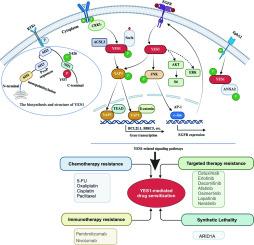Targeting YES1 enhances the efficacy of chemotherapy, targeted therapy and onco-immunotherapy
IF 3.7
2区 生物学
Q2 CELL BIOLOGY
引用次数: 0
Abstract
YES1 (Yamaguchi sarcoma virus homolog 1), a non-receptor tyrosine kinase of the SRC family (SFK), has been abnormally amplified or mutated in several types of solid tumors. The alteration of YES1 impacted multiple biological processes, including promoting tumor progression and metastasis, especially, producing cancer therapy resistance via bypass pathways. Thus, YES1 can serve as a druggable target to overcome drug resistance and suppress tumor growth. Due to toxicity and lack of selectivity, several SFK-targeted agents in clinical trials were limited for further investigation. Recently, the emerging role of YES1-selective inhibitors and the promising approach of combinational therapy have exhibited synergistic anti-tumor effects. Herein, we summarize the multiple mechanisms of YES1-driving tumor progression and resistance, focusing on YES1 inhibitors in combination with other therapies. We also discuss the oncogenic mechanism of the YES1-YAP1 pathway, EGFR-YES1 crosstalk, the roles of YES1 in the tumor microenvironment, and the synthetic lethal effect of YES1 inhibitors. Taken together, available evidences strongly suggest that targeting YES1 could be a promising sensitization strategy for cancer treatment and improve the patient's quality of life.

靶向YES1可提高化疗、靶向治疗和onco -免疫治疗的疗效。
YES1(山口肉瘤病毒同源物1)是SRC家族(SFK)的一种非受体酪氨酸激酶,在几种类型的实体瘤中异常扩增或突变。YES1的改变影响了多种生物学过程,包括促进肿瘤的进展和转移,特别是通过旁路途径产生癌症治疗耐药性。因此,YES1可以作为克服耐药和抑制肿瘤生长的可药物靶点。由于毒性和缺乏选择性,一些sfk靶向药物在临床试验中受到进一步研究的限制。最近,yes1选择性抑制剂的新作用和有希望的联合治疗方法显示出协同抗肿瘤作用。在此,我们总结了YES1驱动肿瘤进展和耐药的多种机制,重点关注YES1抑制剂与其他疗法的联合应用。我们还讨论了YES1- yap1通路的致癌机制、EGFR-YES1串扰、YES1在肿瘤微环境中的作用以及YES1抑制剂的合成致死作用。综上所述,现有证据有力地表明,靶向YES1可能是一种有希望的癌症治疗增敏策略,可以改善患者的生活质量。
本文章由计算机程序翻译,如有差异,请以英文原文为准。
求助全文
约1分钟内获得全文
求助全文
来源期刊

Cellular signalling
生物-细胞生物学
CiteScore
8.40
自引率
0.00%
发文量
250
审稿时长
27 days
期刊介绍:
Cellular Signalling publishes original research describing fundamental and clinical findings on the mechanisms, actions and structural components of cellular signalling systems in vitro and in vivo.
Cellular Signalling aims at full length research papers defining signalling systems ranging from microorganisms to cells, tissues and higher organisms.
 求助内容:
求助内容: 应助结果提醒方式:
应助结果提醒方式:


